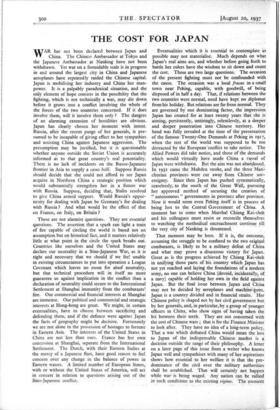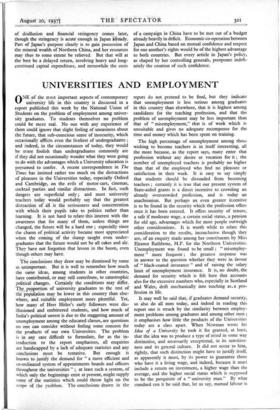THE COST FOR JAPAN
WAR has not been declared. between Japan and China. The Chinese Ambassador at Tokyo and the Japanese Ambassador at Nanking have not been withdrawn. Yet war on a formidable scale is in progress in and around the largest city in China and Japanese aeroplanes have repeatedly raided the Chinese capital. Japan is mobilising her industry and China her man- power. It is a palpably paradoxical situation, and the only element of hope consists in the possibility that the fighting, which is not technically 'a war, may die down before it grows into a conflict involving the whole of the forces of the two countries concerned. If it does involve theni, will' it involve them only ? The dangers of an alarming extension of hostilities are obvious. Japan has clearly chosen her Moment with intent. Russia, after the recent purge of her generals, is pre- sumed to be incapable of giving effect to her sympathies and assisting China against Japanese aggression. The presumption may be justified, but it is questionable whether anyone outside the Soviet Union 'is accurately informed as to that great country's real potentiality. There is no lack of incidents on the Russo-Japanese frontier in Asia to supply a casus belli. Suppose Russia should decide that she could not afford to see Japan acquire in Northern China a strategic position which would substantially strengthen her in a future war with Russia. Suppose, deciding that, Stalin resolved to give China armed support. Would Russia's oppor- tunity for dealing with Japan be Germany's for dealing with Russia ? And what would be the effect of that on France, on Italy, on Britain ?
These are not alarmist questions. They are essential questions. The assertion that a spark can light a train of fire -tipable of circling the world is- bated not on assumption but on historical fact, and it matters relatively little at what point in the circle the spark breaks out. Countries like ourselves and the United States may declare our neutrality in a Sino-Japanese War, as it is right and necessary that we should if we feel unable in existing circumstances to put into operation a League Covenant which leaves no room for aloof neutrality,' but that technical procedure will in itself no more guarantee us against implication in the conflict than -a declaration of neutrality could secure to the International Settlement at Shanghai immunity from the combatants', fire. Our commercial and financial interests at Shanghai are immense. Our political and commercial and strategic interests at Hong-kong are great. We might, in certain eventualities, have to choose between sacrificing and defending them, and if the defence were against Japan the facts of geography might be decisive. Fortunately' we are not alone in the possession of hostages to fortune in Eastern Asia. The interests of the United States in' China are not less than ours. France has her own concession at Shanghai, separate from the International Settlement. The Dutch, with their Eastern Indies at the mercy of a Japanese fleet, have good reason to feel concern over any change in the balance of power in Eastern waters. A limited number of European States,- with or without the United States of America, will act in concert in relation to questions arising out of the"
Sino-Japanese conflict: • Eventualities' which it is essential to contemplate as possible may not materialise. Much depends on what Japan's real aims are, and whether before going forth to battle her rulers have the wisdom to sit down and count the cost. Those are two large questions. The occasion of the present fighting must not be confounded with
the cause. The occasion was a local small
fracas in a sma town near' Peking, capable, with goodwill, of being disposed of in half a day. That, if relations between the two countries were normal, need have kept" no , diplomat
from his holiday. But relations are far from normal. They are governed by one dominating factor, the impression Japan ha& created "for at least twenty years that .-_she is aiming, persistently, untiringly, relentlessly, at a deeper and deeper penetration into Chinese territory. Her hand was fully revealed at the time of the' presentation of the famous Twenty-One Demands at Peking in 1917, when the rest of the world was supposed to be too distracted by the- European conflict to take notice. The Allied Powers did take notice, and those of the demands which would virtually have made China a vassal of Japan were withdrawn. But the aim was not abandoned. In 1931 came the Mukden stroke, and the three Matil! churian Provinces were cut away from Chinete sov- ereignty. Since then Japan has pushed systematically, ceaselessly, to the south of the Great Wall, pursuing her approved method of securing the creation of " autonomous " governments in province after province. Now it would seem even Peking itself is in process of being lost to the Central Government of China. A moment has to come when Marshal Chiang Kai-shek and his colleagues must resist or reconcile themselves to .watching the methodical encroachment continue till the very city of Nanking is threatened.
That moment may be here. If it is, the outcome, assuming the struggle to be confined to the two original combatants, is likely to be a military defeat of. China and what may prove a disastrous victory for Japan. Great as is the progress achieved by Chiang Kai-shek in unifying-those parts of his country which Japan has not yet reached and laying the foundations of a modern army, no one can believe China (devoid, incidentally, Of. a navy) capable of holding her own in the field against Japan. But the final issue between Japan and China may not be decided by aeroplanes and machine=gunt, Japan is a country divided and in financial straits. Her Chinese policy is shaped not by her civil government but by her generals, and, in particular, by a group of younger officers in China,- who show signs of-having taken the bit between their teeth: They are not concerned with the cost of Chinese wars ; that is for the Finance Minister to look after. They hive no idea of -a long-terin policy., That a war which defeated China would mean the loss to Japan of " the indispensable Chinese market is a. doctrine outside the range of their philosophy. A letter on a later page of this issue from a writer who knows Japan well and sympathises with many of her aspirations shows how essential to her welfare it is that the pre- dominance of the civil over the military authorities shall be established. That will certainly not happen while war:. is being waged. Any nation can be rallied in such conditiont to the existing regime: The moment of disillusion and financial stringency comes_ later, though the stringency is acute enough in Japan already. Part of Japan's purpose clearly is to gain possession of the mineral wealth of Northern China, and her resources may thus to some extent be relieved. But that will at the best be a delayed return, involving heavy and long- continued capital expenditure, and meanwhile the costs of a campaign in China have to be met out of a budget already heavily in deficit. Economic co-operation between Japan and China based on mutual confidence and respect for one another's rights would be of the highest advantage to both countries. But every article in Japan's policy, as shaped by her controlling generals, postpones indefi- nitely the creation of such confidence.







































 Previous page
Previous page